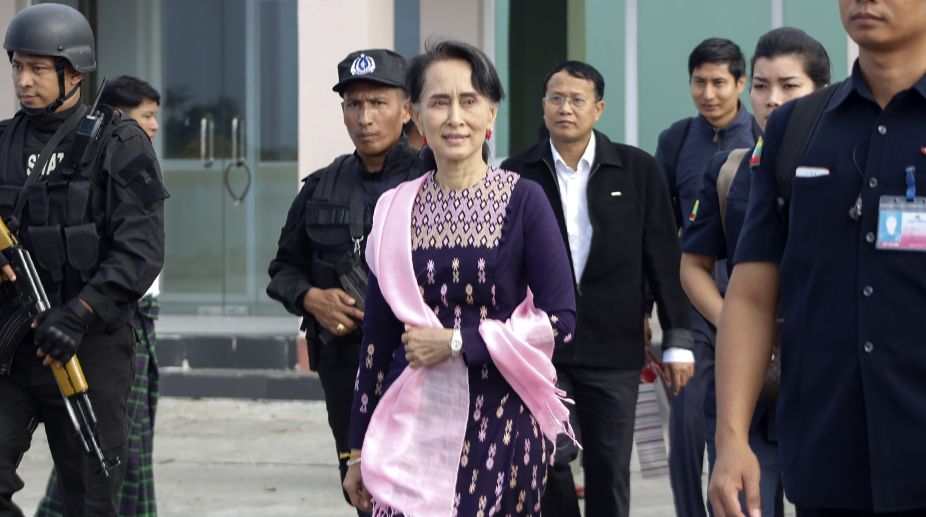Election Farce
Four years after seizing power in a coup, Myanmar’s military rulers continue their desperate yet failing bid to tighten their grip, this time by extending emergency rule under the pretext of preparing for elections.

Myanmar State Counselor Aung San Suu Kyi (C) (Photo: AFP)
After a spell of prolonged and intriguing silence, Aung San Suu Kyi has eventually condescended to visit the province of Rakhine in Myanmar, bordering Bangladesh. Sure, the exodus of more than half a million Rohingya Muslims has further alienated the purportedly democratic dispensation in Naypidaw within the comity of nations.
But the country’s state counsellor has left the world wondering why she took as long as she did to visit the embattled province. In office for close to two years, this was her first trip to the region ~ unannounced and with the approval of the military. There is little doubt that her visit was organised on the terms and conditions of the junta, reaffirming yet again that her silence on the persecution of an ethnic segment has been rooted in the premise that the applecart of democratic/military governance cannot be rocked quite yet.
Advertisement
An all too brief visit to Rakhine was a feeble response to one of the worst humanitarian crisis, reminiscent of the liberation struggle in Bangladesh in 1971. She is yet to face up to the ugly truth. Though the gesture is to be welcomed, she has been suitably wary to avoid a firm statement on the issue, let alone offer an assurance.
Advertisement
Suu Kyi has come under immense pressure from across the world on the Rohingya issue. There have been calls for her to return the Nobel Prize for Peace, and her alma mater, Oxford University, has removed her painting from the campus. Contextualised with the build-up of world opinion against her muted response to the homelessness and persecution inflicted both by the military and the Buddhists, it is hard to escape the conclusion that her visit was no more than an exercise in tokenism. This was not expected of Suu Kyi.
Far from acting as a morale-booster, the visit has left the ethnic group wondering if she is even conscientiously sympathetic to their plight. According to some reports, she told the people that the government is there to help them and that they should “live peacefully and not fight each other”. The homilies, notably the advice “not to quarrel”, chime oddly with the harsh reality that confronts the “nowhere people”.
The statement doesn’t even serve the purpose of playing to the gallery. Theoretically, an elected government is in place but its withers remain unwrung. Far from “fighting each other”, as she imagines, it is intrinsically an offensive by the State ~ as an entity of governance ~ against an ethnic minority. Indeed, the persecution has been condemned by the United Nations as “ethnic cleansing”. The plight of the Rohingyas has been dismally exceptional.
Suu Kyi’s visit to Rakhine has done but little to assuage their plight.
Advertisement